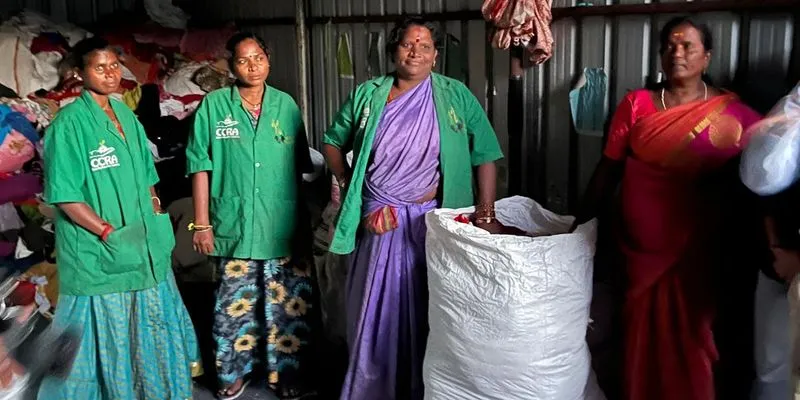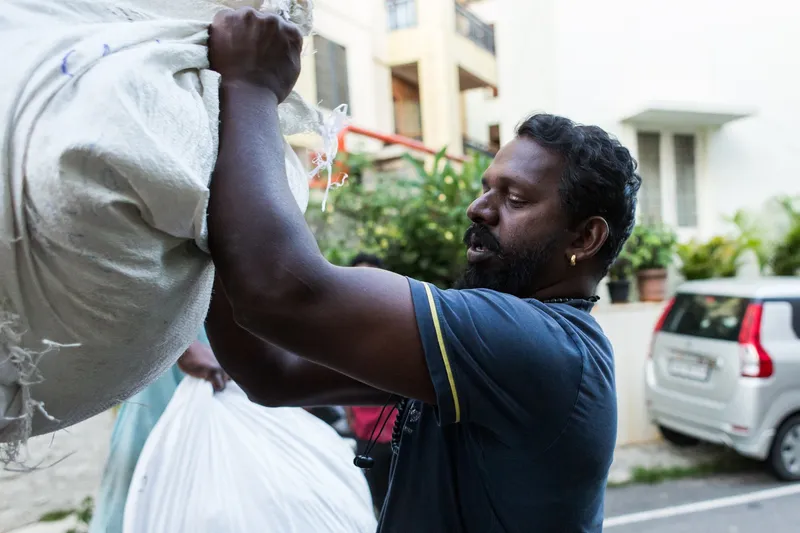Meet Krishna, a waste collector, an entrepreneur, and a champion of change in his community
Krishna, a third-generation waste picker, has tirelessly rallied his community, fighting for their rights and dignity. As an entrepreneur, he provides employment and hope to informal waste pickers and is constantly looking at innovative ways of managing waste.
From sifting through garbage to survive to standing tall today as a waste entrepreneur employing 15 people, Krishna’s story is nothing short of extraordinary.
Over 80 years ago, his forefathers moved from Kallakurichi in Tamil Nadu to Bengaluru in search of a better life. In the city, the traditional bone pickers became part of an informal community of waste pickers in a job that did not bring in a stable income much less offer them dignity or respect.
Tears well up in Krishna’s eyes more than once during our conversation as he recounts his harrowing journey as a third-generation waste picker.
According to him, there are more than 4.25 lakh waste pickers in Karnataka, with 25,000 families in Bengaluru depending on dry waste collection alone.
Krishna has tirelessly rallied his community in the city and the state, fighting for their rights and dignity, in an attempt to break generational cycles of discrimination.
Fighting for dignity and rights
Krishna’s mission goes beyond personal success as he champions climate action through innovative waste management, lending a powerful voice for his community’s fight for dignity and rights.
“I had to drop out of school after seventh standard because a classmate told everyone I was from the waste picker community. They treated me like an outcast and asked me to sit on the last bench. Humiliated, I decided not to go back,” he tells SocialStory.
Krishna joined his mother to pick waste, starting from JC Road, going all the way to Majestic in Bengaluru, walking 6-7 km every day, carrying heavy bags on their heads. He recollects that they segregated the waste on their own, to send it for recycling—long before waste segregation became a norm.
But the heaviness in their hearts was bigger than their physical burden. They were called chappar, a word given to mean ‘a person carrying stolen goods on the shoulder’ when, in fact, they were saving the environment by preventing large amounts of waste from going to the landfills.
Krishna also points out the lack of respect in society.
“We were already from a lower caste. People treated us even below that. There were no facilities, no acknowledgement of the work we were doing or dignity. We earned Rs 40-50 a day, barely enough to survive. People still don’t understand that we give new life to what you have discarded and help combat climate change.”
Upset, disheartened and angry with the way he was treated, Krishna often thought of leaving the community and taking up some other job.
“I often thought I should become a taxi driver or work as an office boy. It would have changed my life, but what about my community?”
This realisation at the age of 18 years prompted him to fight for change. He began to rally the waste pickers together to unite them towards a common goal: bringing credit and dignity to their work and changing their lives.
Meeting Anselm Rosario, Founder of Waste Wise Trust, an organisation that provides waste management solutions, steered Krishna in the right direction. Rosario helped him arrange meetings with other waste pickers, and the fight for change took an organised turn.
“He (Rosario) did not treat me as a waste picker. He did not hesitate to put his arms around me or hug me. He treated me like a human being. He reiterated how important our work was for the nation,” Krishna recalls .
When he was just 21 years old, Krishna attended a large gathering of waste pickers at Jantar Mantar in New Delhi. That’s when he understood that this was not a lone battle, waste pickers throughout the country were fighting for change.
Eleven years ago, the formation of Hasiru Dala, a social impact organisation dedicated to ensure justice for waste pickers, proved to be another turning point.
“We were part of the process, deciding the name and logo. I used to wake up every morning at 4 am, and collect the names and data of the waste pickers,” says Krishna.
In 2011, the first dry waste collection centre was opened in Domlur Ward 112 along with the NGO, on land and a building given by the government.
But the challenges had just begun. The idea was for waste to be deposited at the centre for sorting and segregation, but for the first six months, only 20 to 30 kg waste came in.
In 2012, the team at the dry waste collection centre, led by Krishna, decided to start door-to-door collection. It collected dry waste from 3,000 households, free of cost.
Krishna showed the results to Bruhat Bengaluru Mahanagara Palike (BBMP), the municipal corporation of Greater Bengaluru, which concurred that his model was a good one to replicate.
Partners in waste management

The dry waste collection centre in Domlur, Bengaluru is operated by Krishna. He has a team of women for sorting and segregating the dry waste. Photo by Vinod Sebastian for Enviu
In 2016, based on a case filed at the Karnataka High Court, an order was passed, directing the addition of informal waste pickers to the process of dry waste collection. It was added in the BBMP bylaw to allocate dry waste collection centres for waste pickers, supported by different NGOs.
In 2017, Krishna signed a direct MoU with BBMP to run the dry waste collection in Domlur.
Today, the centre collects 3 tonnes of dry waste in a day and has a team of 15 people, most of them women, who are paid from the income from the sale of the segregated waste.
Apart from this, Krishna organises awareness programmes in government schools on the importance of waste management.
“I am also doing waste management for the Indian Army. It’s a huge honour for me,” he says with a hint of pride in his voice.
Krishna reiterates that they are not just a community of waste pickers but are partners in waste management.
“We have so much knowledge of waste but we hardly get any benefit from it. Data says that if a waste picker picks up a product, he can create eight jobs. Also, waste pickers are a vital part of the economy’s growth. Still we struggle for credit and dignity,” he says.
He adds that, during the pandemic, many waste pickers lost their lives because they chose to work every day.
For Krishna, the rights of his community is paramount. Four years ago, Thyajya Sharmika Sangha was formed to bring informal waste pickers together. Krishna is the vice-president of this association.
Since then, he has visited countries such as Argentina, Ghana and Thailand to speak on waste management, extended producer responsibility, and has taken Thyajya Sharmika Sangha international, as part of the Alliance of International Waste Pickers.
Need for a just transition
Krishna is aware of the implications of the plastic ban on the livelihood of waste pickers and calls for a “just transition” for the 4-lakh-plus community whose livelihood depends on waste.
In 2018-19, Krishna piloted textile waste collection with a visiting American student.
According to a report by Fashion for Good, a platform for sustainable fashion innovation, 8.5% of the global textile waste is accumulated in India every year. While 59% of this waste finds its way back into the textile industry through reuse and recycling, only a fraction of this makes it back into the global supply chain due to quality and visibility challenges. The remaining 41% is downcycled (19%), incinerated (5%) or ends up in a landfill (17%).
“I went to different houses in Domlur and requested them to give textile waste after washing them. At first, we sold them in second-hand markets and got a small income. Wanting to take it to a higher level, we again partnered with Hasiru Dala.
“We gave training to all dry waste centres in Bengaluru in textile waste collection. We collected 180 tonnes of textile waste and sent it for recycling and upcycling to different places,” elaborates Krishna.
However, the door-to-door collection turned out to be a tedious process.
To make textile waste collection more structured and viable, Krishna works as a waste collector for reTex, a venture by Enviu. He is supported by Hasiru Dala and Saamuhika Shakti, a collective impact initiative that brings together 12 partner organisations to help waste pickers in Bengaluru lead a secure and dignified life.
ReTex is a venture building a recovery ecosystem for hospitality textile discards management. It helps in transforming hospitality textile discards into fresh, purposeful textiles/products.
Krishna collects end-of-life hospitality textile discards from the partner hotels of reTex and sorts and segregates them at a dry waste collection centre in a separate space allocated for textile waste. These are then sent for recycling and upcycling by reTex.
“This partnership has enabled us to look at waste in a new direction. I have collected 20 tonnes of clothes. 120 tonnes have come in from 10 dry waste collection centres. I want to open a bigger facility for textile waste as we have the skills and the opportunity,” he says.
Tharun Jagatheri, Venture Builder, reTex by Enviu says, “What is amazing about working with waste entrepreneurs like Krishna is that we do not have to worry about collection. We tap into the extensive network of waste collectors instead of building one from scratch, and, in turn, provide additional sources of income and employment to the waste picker community. It is a win-win for ReTex and the waste picker community.”

Krishna outside reTex’s partner hotel for collection of end-of-life linen. Photo by Vinod Sebastian
Long road to transformation
While Krishna is happy that interventions by NGOs like Hasiru Dala, Waste Wise Trust, civic organisations, and the government have led to change, there’s still a lot to be done.
"I still hesitate to introduce my son to others, fearing he will be labelled as the son of a waste picker. None of us can marry outside our community because the work we do continues to be stigmatised. Despite some progress, we are still known as people who work with waste,” he says.
It’s time we recognise and respect the work of waste collectors, who keep our cities clean, play a critical role in recycling, and contribute towards a sustainable planet.
Edited by Swetha Kannan






